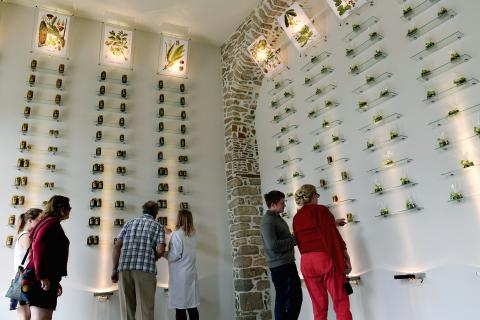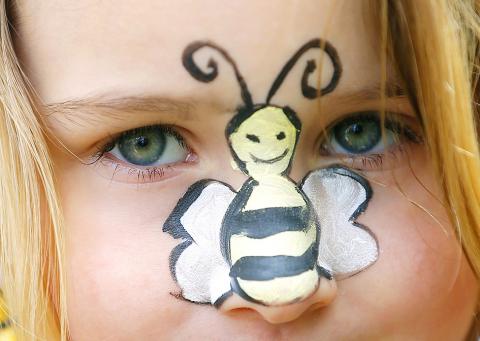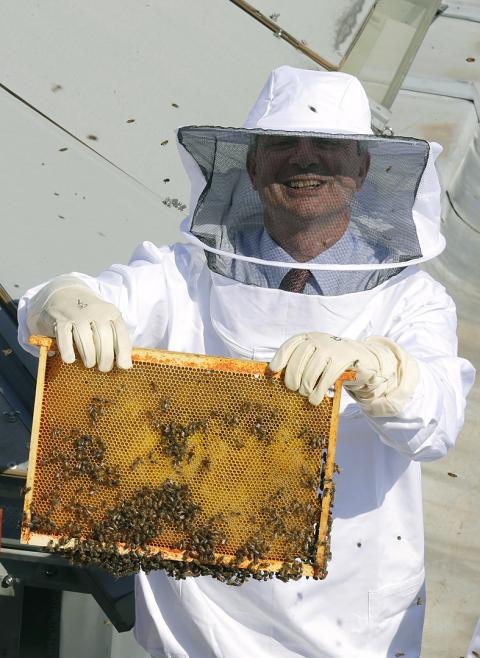The rosemary season has ended, but sage is in full bloom.
In the fragrant hills of the Peloponnese in southern Greece, after a few sharp turns along a path, Nikos Reppas’ old car arrives at bee heaven: a field full of violet hyacinths, close to the prehistoric ruins of Mycenae.
Since antiquity, when according to Greek mythology the god of love, Eros, dipped his arrows into honey before shooting them, the golden liquid has been flowing in abundance in this country, free of genetic modification and gleaned from vast, uncultivated lands.

Photo: AFP
And whereas other countries are struggling with high bee mortality, that is one global crisis that has yet to touch debt-plagued Greece.
“Colony collapse disorder is a problem in the United States and some European countries like Germany and Spain... We don’t have this problem in Greece yet,” said Paschalis Harizanis, a professor at the Agricultural University of Athens.
The reason is that Greek beekeepers are still able to keep their activities at a safe distance from commercial farming, and therefore away from pesticides.

Photo: Reuters
“Greek honey owes its unique aroma and taste to the fact that the better part of Greece is home to forests and wild ecosystems, with only 29.32 percent of the land allocated to farming,” the federation of Greek beekeepers’ associations (OMSE) said.
However, this could change.
Last month, Greece voted in Brussels against a ban on pesticides considered harmful to bees and apiculture. The European Commission wants the insecticides banned for use on four major crops — maize (corn), rape seed, sunflower and cotton — in a bid to prevent a disastrous collapse in the bee population.

Photo: Reuters
Experts have isolated three compounds causing concern — clothianidin, imidacloprid and thiamethoxam, known as neonicotinoids — which are present in insecticides produced by pharmaceutical giants Bayer, Syngenta and Cruiser OSR.
However, with 13 votes in favor and nine against, the ban was not adopted, while a new vote could be scheduled before the summer.
“The Greek vote ... was a major disappointment to us and we fail to understand it,” the OMSE said.
“Not banning the pesticides does not help agriculture. It does not help biodiversity, it does not help humans and insects. No one benefits from bees dying,” said Elena Danali, of Greenpeace Greece.
For 46-year-old Nikos Reppas, a beekeeper in Nafplio whose family has been in the apiculture business for 200 years, life is dictated by flowers.
“In February we have the rosemary flowers, then in March come the sage flowers. Then those of oranges, pollen, the flowers of thyme in June, those of chestnut and oak trees in July, heather in September and carob in October,” he said.
This country of about 11 million has 20,000 registered beekeepers, more than 1,500 of whom make their living from beekeeping, Harizanis said.
The country produces between 12,000 and 17,000 tonnes of honey per year, which makes it the second-largest honey producer in Europe after Spain.
However, there is still a long way to go for Greece in terms of world exports, something the indebted country is desperately in need of.
Despite its striking honey production, Greece last year actually imported more honey than it exported (2,000 tonnes versus 800 tonnes).
Instead of selling to others, Greeks prefer to keep their sweet stuff close to home.
Greeks are the top consumers of honey in the world, with an average consumption of 1.7kg per person compared with 0.4 kg in the US, Harizanis said.
“I love this. There is no other way you can do this profession, if you don’t love it,” Reppas said.
“My father is 77 years old going on 78 and still works professionally. A beekeeper is for life. You are born and you die as a beekeeper,” he said.

SEEKING CLARITY: Washington should not adopt measures that create uncertainties for ‘existing semiconductor investments,’ TSMC said referring to its US$165 billion in the US Taiwan Semiconductor Manufacturing Co (TSMC, 台積電) told the US that any future tariffs on Taiwanese semiconductors could reduce demand for chips and derail its pledge to increase its investment in Arizona. “New import restrictions could jeopardize current US leadership in the competitive technology industry and create uncertainties for many committed semiconductor capital projects in the US, including TSMC Arizona’s significant investment plan in Phoenix,” the chipmaker wrote in a letter to the US Department of Commerce. TSMC issued the warning in response to a solicitation for comments by the department on a possible tariff on semiconductor imports by US President Donald Trump’s

‘FAILED EXPORT CONTROLS’: Jensen Huang said that Washington should maximize the speed of AI diffusion, because not doing so would give competitors an advantage Nvidia Corp cofounder and chief executive officer Jensen Huang (黃仁勳) yesterday criticized the US government’s restrictions on exports of artificial intelligence (AI) chips to China, saying that the policy was a failure and would only spur China to accelerate AI development. The export controls gave China the spirit, motivation and government support to accelerate AI development, Huang told reporters at the Computex trade show in Taipei. The competition in China is already intense, given its strong software capabilities, extensive technology ecosystems and work efficiency, he said. “All in all, the export controls were a failure. The facts would suggest it,” he said. “The US

The government has launched a three-pronged strategy to attract local and international talent, aiming to position Taiwan as a new global hub following Nvidia Corp’s announcement that it has chosen Taipei as the site of its Taiwan headquarters. Nvidia cofounder and CEO Jensen Huang (黃仁勳) on Monday last week announced during his keynote speech at the Computex trade show in Taipei that the Nvidia Constellation, the company’s planned Taiwan headquarters, would be located in the Beitou-Shilin Technology Park (北投士林科技園區) in Taipei. Huang’s decision to establish a base in Taiwan is “primarily due to Taiwan’s talent pool and its strength in the semiconductor

French President Emmanuel Macron has expressed gratitude to Hon Hai Precision Industry Co (鴻海精密) for its plan to invest approximately 250 million euros (US$278 million) in a joint venture in France focused on the semiconductor and space industries. On his official X account on Tuesday, Macron thanked Hon Hai, also known globally as Foxconn Technology Group (富士康科技集團), for its investment projects announced at Choose France, a flagship economic summit held on Monday to attract foreign investment. In the post, Macron included a GIF displaying the national flag of the Republic of China (Taiwan), as he did for other foreign investors, including China-based